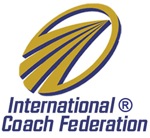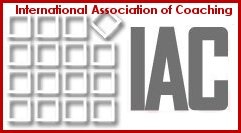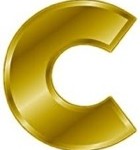 If you are seeking coach training and certification, you have many different avenues. The good news is, if your training is based on the core coaching “skills” taught by either IAC or ICF, you will find that their coaching “masteries” or “competencies” are in alignment. Some people get confused and assume there are differences in the skills that are taught, but actually these two organizations’ core coaching skills align.
If you are seeking coach training and certification, you have many different avenues. The good news is, if your training is based on the core coaching “skills” taught by either IAC or ICF, you will find that their coaching “masteries” or “competencies” are in alignment. Some people get confused and assume there are differences in the skills that are taught, but actually these two organizations’ core coaching skills align.This post is the first in a series where we will look more closely at the definitions of the 9 IAC Coaching Masteries and the 11 ICF Coaching Competencies. You may wonder, why doesn’t IAC have 11 Coaching Masteries instead of 9? The first 2 ICF Competencies are around the ethical guidelines, standards and coaching agreement. At IAC, these are taught right up front before getting into “skills”. The IAC Ethical Standards are just as important in the training; it is simply a separate stand alone topic. Personally, I like teaching the ethics and standards topics prior to the coaching skills to emphasize the critical importance of ethics and professionalism.
 Let’s look at IAC Mastery 1 – Establishing and Maintaining a Relationship of Trust defined as “to ensure a safe place for personal growth, discovery and transformation”. One can see it aligns beautifully with ICF Competency 3 – Establishing Trust and Intimacy with the Client which is defined as “ability to create a safe, supportive environment that produces ongoing mutual respect and trust”.
Let’s look at IAC Mastery 1 – Establishing and Maintaining a Relationship of Trust defined as “to ensure a safe place for personal growth, discovery and transformation”. One can see it aligns beautifully with ICF Competency 3 – Establishing Trust and Intimacy with the Client which is defined as “ability to create a safe, supportive environment that produces ongoing mutual respect and trust”. The effect and key elements of successfully demonstrating this coaching mastery or core competency is the same. What will a coach see in a client when the skill is used successfully? A coach will see the client opening up to share concerns or fears, sharing bold aspiration and dreams, acknowledging emotions and being receptive to the coach.
Both ICF and IAC are the two most recognized and respected coach certification international organizations. Use the links below to learn more about the International Coach Federation (ICF) and the International Association of Coaching (IAC) certification requirements.
What are the ICF Certification requirements?
What are the IAC Certification requirements?
-
A book that I have picked up and read again and again is “Visioneering: God’s Blueprint for Developing and Maintaining Personal Vision” by Andy Stanley. If you don’t have clear vision for your life, or even if you do this is a phenomenal read.

Stanley says that “Vision is a clear mental picture of what could be, fueled by the conviction that it should be.” I know that God has likely given you a vision, even if you don’t realize it, maybe you see it as a dream, or a purpose, but either way it is there and God wants you to fulfill it, or at least chase after it as hard as you can.
The vision that He has given you is not an accident. Once you discover it you will have within you a deep desire to follow it and make sure that it is fulfilled, even if others around you don’t see it, or if they discourage you from pursing it.
Stanley points out all the possibilities. He doesn’t paint a picture of being a visioneer that is all roses and no thorns. The truth is, it can be difficult. His formula for visioneering is this:
VISIONEERING = Inspiration + Convicting+ Action+ Determination+ Completion
We must pursue the visions that GOD has placed into our lives. Vision can be emotional, passionate, motivating, and inspiring but it can also be tiring, discouraging and difficult. Don’t let that stop you.
Here at Christian Coach Institute our purpose, our mission, our vision is Educating, Equipping and Encouraging Christian Coaches Around the World. As a coach, you must have a personal vision or mission, you must know it, you must own it, especially if you’re going to guide others in doing the same.
What is your vision, your mission? Share it with us! Share it with the world!
-
 As Christian coaches there is much that we must consider when we begin working with our clients. Coaching is not a job that should be taken lightly. We must always keep some things in mind, including the three C’s of Christian Coaching. Say that three times fast!
As Christian coaches there is much that we must consider when we begin working with our clients. Coaching is not a job that should be taken lightly. We must always keep some things in mind, including the three C’s of Christian Coaching. Say that three times fast!The Character of Christ Jesus, Competencies and Being Coachable
First, let’s consider our character. Especially as a Christian coach we must remember that our character should be top notch. We after all should be representing Jesus Christ above anything or anyone. We therefore, in many cases, are being Jesus himself to others. How would you describe the character of Jesus and how do you role model these traits to your clients? Remember this as you coach. In Laurie Beth Jones book, Jesus as Life Coach, she writes about the empathic listening of Jesus and the art of asking powerful questions, which are two key skills in coaching. From carpenter to Savior, Jesus first transformed himself, then the world.
Next, let’s consider our coaching competencies (also known as Coaching Masteries) and the importance to study, learn and grow in the these skill areas. There are nine IAC Coaching Masteries. Watch for future posts as we explore these 9 masteries in greater detail. These include:
- Establishing and maintaining a relationship of trust.
- Perceiving, affirming and expanding the clients potential.
- Engaged listening.
- Promoting the present.
- Expressing.
- Clarifying.
- Helping the client set and keep clear intentions.
- Inviting possibility.
- Helping the client create and use support systems and structures.
The third C is coachable. Yes, a coach too needs to be coachable. A coach is always growing. This includes our own walk of faith, growing deeper in our faith, and remaining coachable. What does it mean to be coachable? Coaches are continuous learners about themselves, and their experiences and they work to enhance their skills unceasingly.
-
 Our last profile to look at through the lens of the DiSC profile is our “C” – “Compliance” (Melancholy or Beaver).
Our last profile to look at through the lens of the DiSC profile is our “C” – “Compliance” (Melancholy or Beaver). As a coach who is a high “C”, you are reserved and more task-oriented than people oriented and you like structure around your coaching sessions so the call prep form and clients who show up on time are important to you. Unlike the “D” and “I” who are fast paced in their walk and talk, you are more reserved and you speak and move at a slower pace. Because of your more relaxed state, people are relaxed around you and find it easy to talk to you. As a coach, you want to avoid getting bogged down in logistics. Since your goal is “get it right,” keep in mind that the client must be allowed to dream big, which is sometimes hard for a high “C” personality because you worry about getting it “right.” Once they identify the goal, and where they want to be, “C’s” are very good at helping to put a plan in place for their client’s success. And remember the importance of endorsing your client, and encouraging them to think creatively; you will learn from them.
How do you coach a client who is high “C?” The “Compliance” appreciates structure so they will like an organized approach to the sessions and like to use a pre-call coaching form. Allow them time to collect their data and facts to bring to the session. The “C” personality is tenacious, working hard to complete the task and has a tendency to get bogged down in details. This is where a coach can help because as a coach, you can help them to expand their vision to see the bigger picture and encourage them to think out of the box. The “C” is a wealth of information. Remember, these are the data collectors and they have a lot stored! Tap into their data bank and draw out creative ideas… they have them! There is resistance to trying new ideas until they have all the data and sometimes may not know when to stop gathering data and start an action plan. The “C’s” goal is to get it right and they fear making a mistake. A good questions to ask a “C” may be “What key information is critical to understand before making a decision?” You may help them avoid getting too bogged down in details that may not be important to the decision. And then, work with them to have a good support structure to help them be successful.
If you are a coach, a leader, a Human Resource professional, counselor or of any other profession seeking greater understanding into human behavior, learn more about our DISC Training and Certification Course